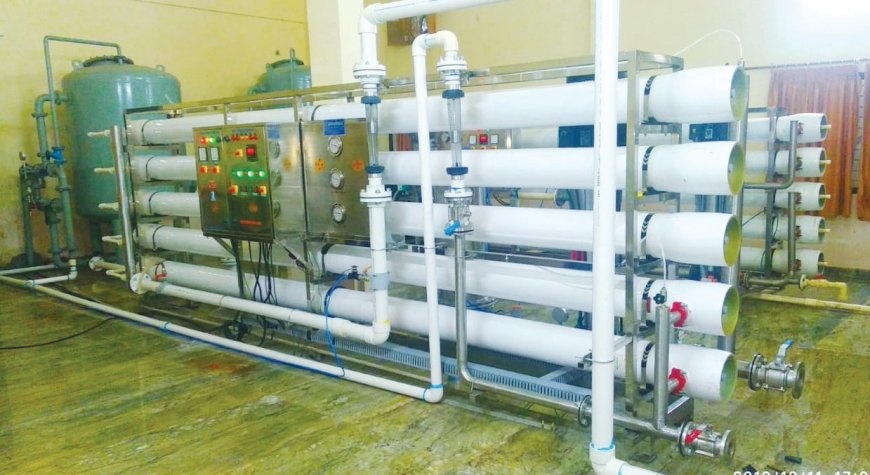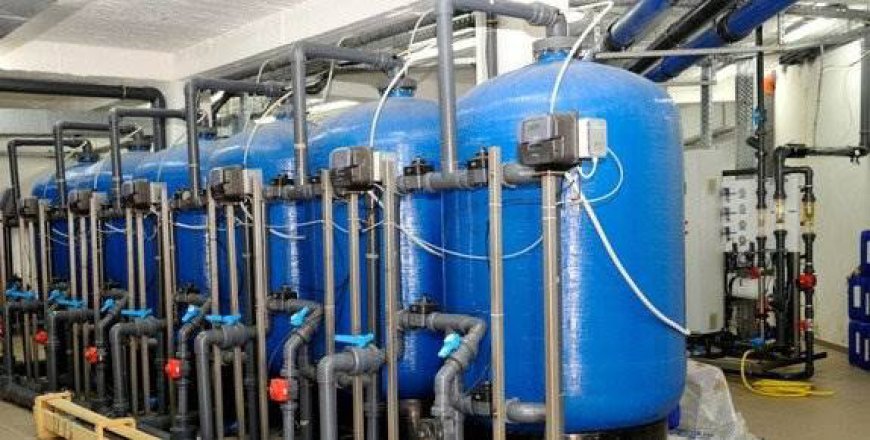Our work is crucial in today's world, where clean water is becoming increasingly scarce.

Mohammed Abdul Rahman
CEO, Sahara Industry
How challenging is the current demand-supply scenario of water in India for domestic and commercial/industrial use?
Water scarcity is a major challenge in India, affecting over 600 million people, reported by the Niti Aayog. Extreme water shortages have forced some industrial units to close due to lack of water. India's water demand-supply balance is complex and varies widely across regions. Domestic water demand is expected to rise from 56 BCM in 2000 to 73 BCM by 2025 and 102 BCM by 2050. With a growing population, changing lifestyles, and expanding industries, both domestic and industrial water needs are projected to increase sharply.
The industrial water demand is expected to multiply from 42 BCM in 2000 to 92 BCM by 2025 and 161 BCM by 2050. The average annual per capita water availability for year 2025 and 2050 has been assessed as 1,340 cubic meter and 1,140 cubic meter respectively, declining sharply from 1,545 cubic meter in 2011. To address these challenges, the government has launched several initiatives aimed at improving water resource management, promoting water conservation in agriculture and encouraging water efficiency in industries. However, balancing supply and demand remains a critical challenge for India's future.

What is the importance of bringing in more awareness about water security among consumers?
Raising awareness about water security is vital for many reasons. When people understand the importance of water, they are more likely to conserve and use it wisely. They will buy appliances that use less water. When consumers know more about water security, they become more environmentally conscious. This can lead to better protection of rivers, lakes, and other water bodies as the proper awareness and knowledge will help reducing pollution in water sources.
There are also financial benefits. Using less water usually means lower water bills for homes and industries. It can also reduce the costs of transportation, treatment, pumping and delivering water. Clean water is crucial for health and hygiene and when people understand this, they are more likely to practice good hygiene habits and help prevent diseases spread through unclean water.
With increased awareness, people and industries are more likely to support policies that protect water resources and adopt reuse facilities. With zero-liquid-discharge policies, industries will get involved in their water management, leading to better solutions that fit their production needs.
How is the progress of water infrastructure development in the country? What kind of improvements is needed?
India has been working carefully on improving its water systems, and government has initiated a number of good projects. The leading one is the Jal Jeevan Mission, which aims to bring clean drinking water to every household in the country in both urban and rural areas. Namami Gange and other wastewater treatment projects have been instrumental in increasing the sewage and effluent treatment capacities over the past few years. The rain water harvesting has been supporting with ground water recharge.
But there are challenges remain to address. The water distribution network in the country is still running on old pipes and systems leading to significant water loss. They need to be fixed to reduce losses and work well.
India needs more ways to clean and reuse wastewater to make sure there is enough water available for potable purposes. Matching guidelines and policies are important to encourage sectors such as agriculture, horticulture and industries to use treated water instead of fresh water leading to water saving and less polluted water being disposed into water bodies. While India has made some progress with its water management, there is still a long way to go. The country needs to work on all these areas together to make sure everyone has enough clean water for the future.

Can you elaborate on the company’s major projects in water distribution and wastewater recycling?
Sahara Industry creates advanced water treatment solutions for both communities and businesses. We design and manufacture high-tech components and complete systems that clean and purify water of global standard. Our work is crucial in today's world, where clean water is becoming increasingly scarce.
Sahara Industry has executed several hundred projects with advanced water treatment technology to ensure that people have a steady supply of safe drinking water. This is especially important in areas where water sources are contaminated or unreliable. By providing clean water, our systems play a vital role in improving public health. We help prevent waterborne diseases and contribute to better overall hygiene for the people.
In the industrial sector, our solutions are equally important. Many industries require large amounts of clean and pure water for their production facilities. Food and beverage, pharmaceutical and other industrial units need pure water for their products, while other manufacturing plants often use cleanest water in their production processes. Sahara Industry's water treatment systems help diverse industries to maintain consistent production quality and efficiency with clean water solutions.
By providing advanced water treatment solutions, Sahara Industry contributes to sustainable water management. We have consciously designed our systems that help conserve water resources by enabling the reuse of treated water in industrial processes. This is particularly important in regions facing water scarcity. As the water demand continues to rise due to population growth and industrial expansion, Sahara Industry play a crucial role in ensuring that clean water remains accessible. Our innovative approaches to water treatment help communities and industries adapt to changing water availability and quality challenges, supporting both public health and economic development.
What is your vision on sustainable water infrastructure? What are your future plans?
My vision for sustainable water infrastructure prioritizes integrated water resource management that balances the needs of urban, agricultural, and industrial sectors. It should be resilient to climate change and other pressing challenges by incorporating adaptive technologies like rainwater harvesting and water recycling and reuse. Ensuring equitable access to water for all is essential. Protecting ecosystems and involving local communities in decision-making will enhance the effectiveness of water management initiatives. Innovative financing, data-driven approaches for monitoring, and public education on water conservation are crucial to this vision. Ultimately, the goal is to secure reliable and safe water supplies while promoting environmental sustainability and social equity for current and future generations.
We use advance technology to develop innovative water treatment solutions that meet international quality standards. Our systems are designed to withstand the impacts of climate change while complying with policies and regulations for sustainable water use.
Sahara Industry’s future plans focus on expanding its role in developing sustainable water infrastructure and enhancing its product offerings through innovation and advanced technology. We will actively promote water-saving technologies across all sectors to enhance efficiency and ensure equitable access to water resources, contributing to the creation of a sustainable and inclusive water infrastructure for the future.







